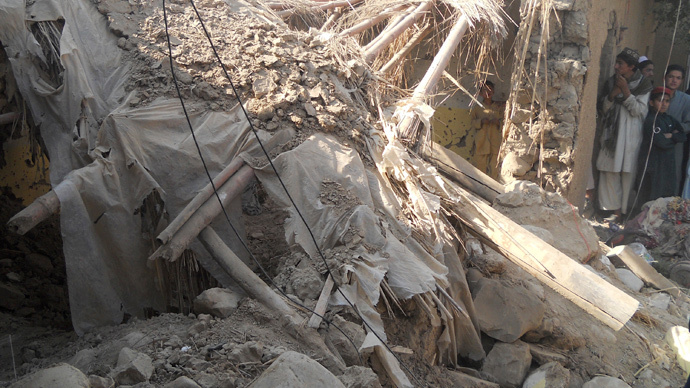US drone strikes designed to purge (and promote) Al Qaeda leaders

US drone strikes are a means of purging some Al Qaeda leaders and promoting others, thus making them a more effective instrument of regime change and regional destabilization.
Nasir al-Wuhayshi, leader of Al Qaeda in the Arab Peninsula, an amalgam of the Yemeni and Saudi branches of the Al Qaeda franchise, was executed in a US drone strike Monday. He was reportedly killed whilst relaxing on a beach in Mukhalla, part of a vast swathe of territory the group has gained, courtesy of US- and British-supported Saudi airstrikes over recent months.
With characteristic triumphalism, US National Security Council spokesperson Ned Price said that Wuhayshi's death had struck a "major blow" to the organization, a view echoed on the BBC, who called the killing a “big blow.” CNN terrorism analyst Paul Cruickshank went one further, calling his death "the biggest blow against al Qaeda since the death of (Osama) bin Laden”. A typically diverse range of opinion, then, from our democratic representatives and the media outlets that hold them to account.
READ MORE: Al-Qaeda Yemen leader Wuhayshi killed in airstrike - Al-Qaeda spokesman
Not everyone shares this rosy view, however. "Celebrating the death of al-Wuhayshi as if it means the death of AQAP is a very flawed way to look at this," commented Adam Baron, a visiting fellow at the European Council on Foreign Relations, to the International Business Times. For one thing, the assassination immediately catapulted AQAP military chief Qassim al-Raymi to the top position in AQAP.
Yemen analyst Hisham al-Omesiy says that Raymi is “more dangerous and aggressive” than Wuhayshi, and predicts that “you will be seeing a more aggressive Al-Qaeda” from now on. This is an outcome which likely suits the US, now in a de-facto alliance with Al Qaeda in the war against Houthi rebels in Yemen, as well as across much of the rest of the region, very well.
Judging from their public activities, there do seem to have been some real differences between the dead leader and his replacement over how to conduct the war against the Houthis. Whereas Raymi had organized suicide bombings at religious gatherings, such as the one that killed 33 Zaydi Shia last December, Wuhayshi had emphasized “clear instructions to the operating cells to avoid attacking mixed gatherings and to focus on armed Houthis,”according to another assassinated AQAP operative, al Ansi.
It is revealing that this comment was made in January, intended
perhaps as a veiled criticism of Raymi’s actions. In this light
the assassination, and its replacement of Wuhayshi with Raymi,
may well represent a US desire to see AQAP “take the gloves
off” in the battle for Yemen, especially given the new
urgency resulting from the spillover of the war into Saudi
Arabia.
The use of Al Qaeda as a proxy force to fight the West’s wars has
always been riddled with danger, of course, especially given that
organization’s (at least theoretical) commitment to attacking the
West itself. Hence the need to conduct these periodic purges,
which take out those less conducive to serving the West’s
regional strategy and replace them with those better placed to do
so.
READ MORE: 45 veterans sign letter urging drone pilots to stand down
In this light, the recent assassination is not so dissimilar to that of Bin Laden’s. The late Al Qaeda leader, in his last years, had become increasingly disillusioned with the direction his movement was heading, criticizing its growing sectarianism and expressing anger and frustration that its members seemed more interested in perpetrating sectarian violence against fellow Muslims than in fighting Israel and the West. Zawahiri, on the other hand – the movement’s second-in-command, who immediately took over the reins of leadership following Bin Laden’s death – had always been more ambivalent on this issue. While he criticized Zarqawi, the leader of Al Qaeda in Iraq, for his murderous attacks on Shia civilians, by 2010 he himself was virtually calling for a holy war against the Shia.
Given the West’s strategy of co-opting sectarian militias as proxy armies for its coming wars against Libya and Syria at this time, it was clear which of these men would be best suited for resurrecting the old jihadist-imperialist alliance. It is no coincidence then, that just as these wars began to get under way, Bin Laden was taken out and his organization effectively handed over to Zawahiri, who, aside from the occasional token massacre in Boston or Paris, has happily thrown his fighters wholeheartedly into a deadly sectarian war against the region’s last remaining independent powers, in open alliance with the “crusaders” his organization is supposedly committed to destroying.
If recent testimony from a former AQAP operative is to be believed, Raymi may turn out to be a similarly dependable ally. In an explosive interview with Al Jazeera recently, Hani Mujahid, a member of Al Qaeda since the 1980s who later became an informant for the Yemeni security services, claimed that Raymi was also working for Yemeni intelligence, calling him "a creation of Yemen's National Security Bureau."
Mujahid claimed that both he and Raymi had reported to Colonel Ammar Saleh, Yemen’s deputy security chief, nephew of former President Saleh and a key link between Yemeni forces and the US under both his uncle’s rule and that of President Hadi. If Raymi had been working for Colonel Saleh, and Saleh for the US, all along, no wonder US planners were so keen to facilitate his control of AQAP; he was, whether directly or indirectly, their man.
READ MORE: Carter: US military can’t find enough ‘capable, motivated’ Iraqis to train against ISIS
Of course, the US could not have been sure that Raymi would assume the top job following the death of his boss – especially since (rare as it was amongst top-level Al Qaeda leadership), he had no fighting experience from the Afghan war of the 1980s. But April’s drone killing of Ibrahim al-Rubaish, AQAP’s “spiritual leader,” and Nasser al-Ansi, took out his two major potential rivals and helped clear his way to the top.
Raymi himself certainly seems to have had protection from drone attacks. As Clayton Swisher wrote: “Mujahid pointed out to Al Jazeera in 2014 how many of AQAP's leaders have been eviscerated in the US-led drone campaign. Every one, that is, except Raymi, who has also miraculously survived Yemeni security force raids as well as cruise missile strikes. Mujahid intimates that, because Raymi was collaborating with Ali Abdullah Saleh’s government, he had been spared: "Qassim al-Raymi comes from Rima… How is it that this man is not getting killed? It is impossible for someone to come from outside of the tribe and live in a strange tribe. His looks, his dialect are different, and when you are a stranger, you become an easy target for the Americans. The sons of the tribes can hide. Indeed, many of the leaders whom Ali Abdullah Saleh could not contain were liquidated using drones as well as in ground ambushes.”
Raymi was not the only one who avoided liquidation. A highly revealing article in the Sunday Times last year discussed how the assassination of master AQAP bomb maker Asiri was averted at the last minute by a sudden CIA “change of plan,” only for him to turn up in Syria as a key part of the terror campaign against the Syrian government then being supported by the West.
Morten Storm, an MI5 agent working in AQAP, had devised a plan to deliver a cool box fitted with a tracking device to Ibrahim al Asiri, “the architect of a new generation of stealth bombs” so that he could be assassinated in a US drone strike. But “Storm says he was forced to pull out of the mission two years ago at the last minute after the CIA insisted that he deliver the cool box in person rather by courier, thus putting his own life at risk... Western security officials believe that Asiri has since passed on his bomb making skills to foreign fighters in training camps in Syria... Storm intended to fly to Yemen and arrange for the cool box to be delivered by courier, a method that had previously been used by the spy agencies. At the 11th hour, however, he says the CIA insisted on him delivering the equipment in person."
The change of plan caused Storm to think the Americans may also have wanted him taken out in any future drone strike; he therefore aborted the mission.
READ MORE: US considers opening more military hubs in Iraq to fights ISIS
The US drone war against Al Qaeda may be nothing more than an elaborate method of promoting leaders and operatives happy to keep the movement working as an effective tool of US-British strategic regional policy. Where the Israelis “mow the lawn,” to use their own fascistic lingo, the US are a little more subtle; they weed the garden, so to speak - allowing their “flowers” – the Asaris and the Raymis – to flourish.
But the threat of drone strikes also serves another purpose – it is an effective way of not only controlling operatives, but also recruiting them. In the interview referred to earlier, Mujahid goes on to claim that those who refused to work as informants for Yemeni intelligence were themselves targeted for assassination: “I know many shabab [youth] who were offered to work in the National Security Bureau but they refused. As a result they were severely harassed by the security. They were forced to go to Abyan and to Hadramout where they were liquidated with drones upon the assumption that they were leading figures within Al Qaeda organization posing a danger to the US.”
The claim bears an uncanny resemblance, though on a more brutal scale, to one reported by the Independent in 2009: that MI5 was trying to recruit British Muslims to work as agents within various militant formations by threatening them that they would be arrested and harassed under anti-terror laws if they refused.
The war on terror – with its inevitable corollary that all those labeled “terrorists” can be stripped of their rights and even their life – is, as it turns out, just the leverage the security forces need to recruit terrorists.
The statements, views and opinions expressed in this column are solely those of the author and do not necessarily represent those of RT.
The statements, views and opinions expressed in this column are solely those of the author and do not necessarily represent those of RT.












